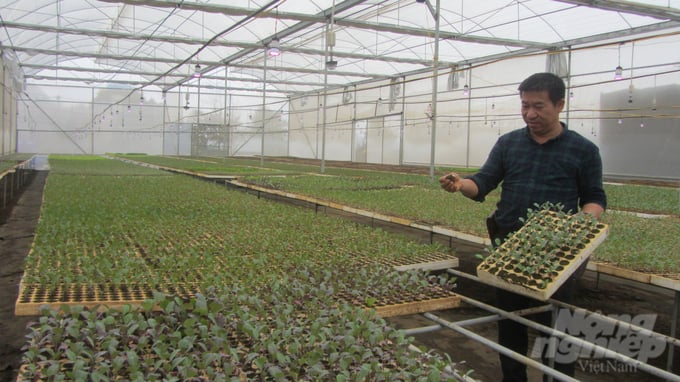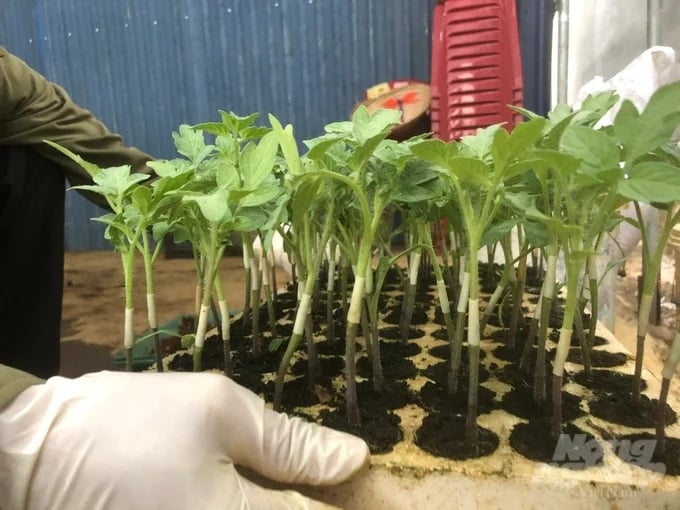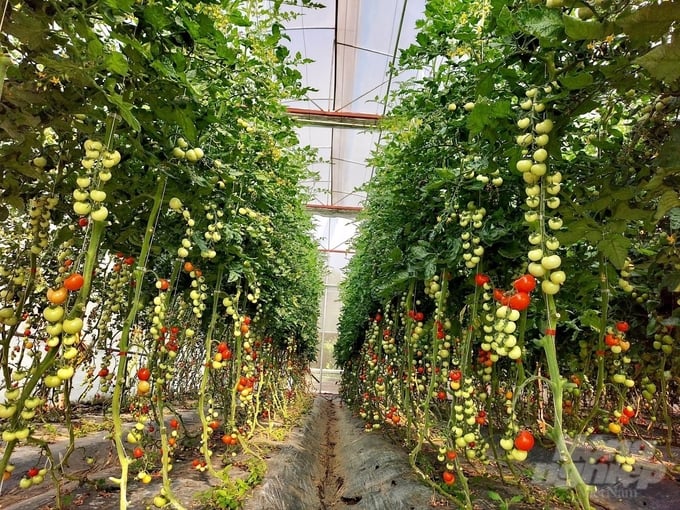November 25, 2025 | 12:47 GMT +7
November 25, 2025 | 12:47 GMT +7
Hotline: 0913.378.918
November 25, 2025 | 12:47 GMT +7
Hotline: 0913.378.918

Greenhouse for producing vegetable seedlings of Mr. Tu. Photo: Hai Tien.
Mr Nguyen Trong Tu in Nong Truong town (Moc Chau district, Son La) has successfully produced over 3 million vegetable seedlings per year with a revenue of over VND 1 billion, thanks to his more than 1,000m2 greenhouse.
The impressive production of various types of vegetable seedlings is attributed to Mr Tu receiving technical support from the Future Smart Agriculture for Future Generations Project of the Food and Agriculture Organization (FAO). He has learned techniques such as selecting healthy seeds, germinating vegetables on clean and sterilized beds inside the greenhouse, and grafting for high-value economic crops. As a result, the germination rate of the seeds reaches nearly 100%, unaffected by adverse weather conditions, fungi, viruses, bacteria, or harmful pests.
"Despite the current high income, I have experienced numerous significant losses. The first time, I sowed seeds directly on the ground without a greenhouse covering, causing almost all the seedlings to be damaged by rain, sun, and fungal diseases. The second time, with support from FAO Vietnam in terms of greenhouse, trays, and seed prices, I underestimated the temperature difference between day and night (over 10 degrees Celsius), causing over 50,000 tomato, bell pepper, and Happy 7 melon seedlings to die after grafting. The third time, I sold seedlings directly from the greenhouse to people without proper training, resulting in many seedlings dying after transplantation, leading to significant compensation for the households that purchased them", Mr Tu shared candidly.

Grafted tomato plants on Potan (Korea) rootstock. Photo: Hai Tien.
After receiving technical training from the FAO, Mr Tu learned that the climate in Moc Chau (Son La), like in Da Lat (Lam Dong), can experience four different weather conditions in a single day. Even within the same village or commune, it can rain in one place, be sunny in another, or have thick fog, causing the vascular systems in newly grafted vegetables to fail to connect, leading to anaphylactic shock and mass die-offs.
After the training, to graft vegetable seedlings, Mr Tu has to listen to the long-term weather forecast for the area and only proceed with sowing and grafting on dry days with low day/night temperature differences. Additionally, he must train the seedlings to gradually adapt to the natural environment, ensuring the plants are healthy and well-established before selling them to growers.
According to Mr Tu, the technique for grafting vegetable seedlings is very simple: quickly and handly bevel off the top of the rootstock, insert a specialized rubber tube into the rootstock stem, then cut the seedling's top and insert it into the rubber tube so that the two cuts match perfectly, ensuring no water seeps into the graft.
The rootstock seeds need to be sown 5-30 days before the scion seeds. It's important to choose high-yield, high-quality grafted seedlings with good disease and heat resistance, and to select rootstocks that are resistant to soil-borne fungi, bacteria, and nematodes. In the Moc Chau area, grafted vegetable seedlings can be planted year-round, the best option is the tomato seeds grafted with Potan tomatoes (Korea) rootstock.

A garden of indeterminate-growth tomatoes planted with grafted seedlings. Photo: Hai Tien.
Mr Giang A Kia from Phieng Tien village, Phieng Luong commune (Moc Chau) bought cabbage and tomato seedlings from Mr Tu. The plants achieved a nearly 100% survival rate, growing vigorously with high quality, and generating profits of VND 1 - 1.2 billion/ha (depending on the season).
Mr Giang A Kia mentioned that grafted vegetable seedlings have good resistance to difficult-to-control diseases, for which there are no specific pesticides, such as bacterial wilt, fusarium wilt, and soil-borne nematodes. This resistance helps extend the harvest period, increase yield and quality, and enhance farming efficiency.
Mr. Giang A Su from Bo Bun village (Nong Truong town) shared that, due to limited arable land, he always chooses to buy pre-grafted, high-value vegetable and fruit varieties like muskmelon and indeterminate growth tomatoes. As a result, the plants are less prone to diseases, produce many flowers and fruits, and provide high income (nearly VND 2 billion/ha/year).
"Producing vegetable seedlings in greenhouses shortens the growth period by about 5-7 days, which helps increase production cycles and the output of seedlings from the garden. Grafting should only be done for economically valuable vegetables such as Happy 7 muskmelon and indeterminate-growth tomatoes. Other vegetables like cabbage, kohlrabi, cauliflower, celery, Chinese cabbage, kale, and chilli peppers should be grown from seeds", according to Mr Tu.
Translated by Hoang Duy

(VAN) The information was shared at the seminar 'Urban Agriculture - Solutions for Developing Green Spaces,' organized by the Kinh te & Do thi Newspaper and the Biotechnology Center of Ho Chi Minh City.
/2025/11/19/4141-2-132831_216.jpg)
(VAN) One of Japfa's outstanding solutions is implementing digital transformation and artificial intelligence (AI) to optimize operations, enhance productivity, and advance sustainable development.
/2025/11/19/4847-1-093540_448.jpg)
(VAN) The Gia Lai Provincial People’s Committee had a working session with the delegation of the U.S. Department of Agriculture, the State of Idaho, and representatives of the State's leading enterprises.

(VAN) Ca Mau has a sufficient foundation to become a strong regional aquaculture center, where production integrates the economy, the environment, and the lives of the people.

(VAN) SEIKI Group envisions itself as a pioneer in the ‘dual transformation’ of digital technology and green industry, standing alongside the Government and Vietnamese businesses in their pursuit of sustainable development.

(VAN) The VNGEONET network affirms Viet Nam's progress in mastering digital space, providing a precise positioning data platform to serve socioeconomic development.
/2025/11/14/3247-1-184556_35.jpg)
(VAN) Thai Nguyen is methodically implementing digital transformation in the livestock sector, laying the foundation for a modern, transparent, and sustainable agriculture.